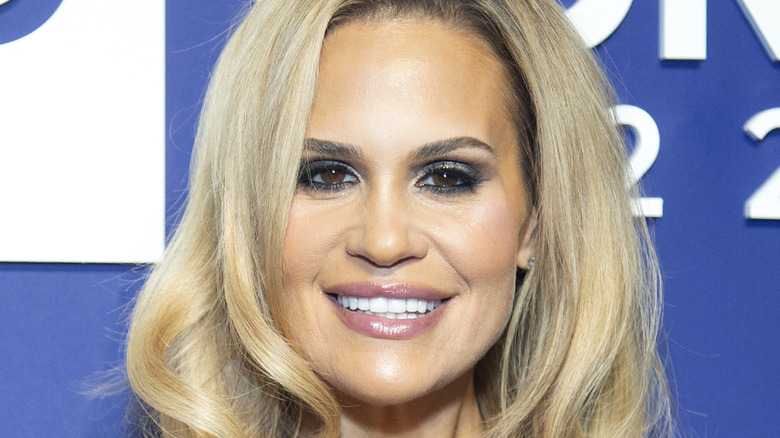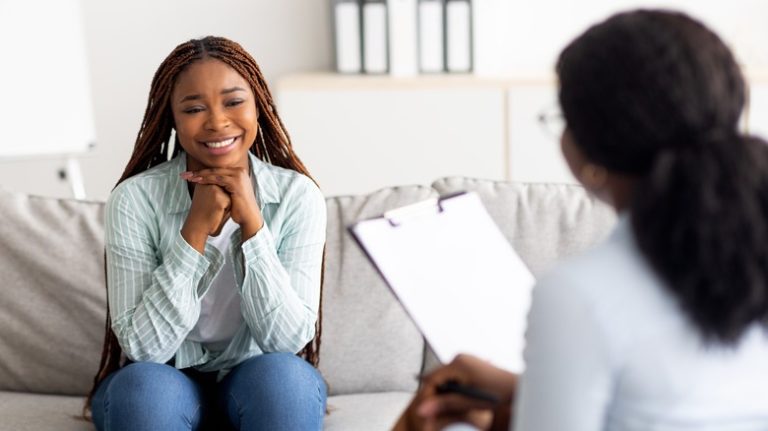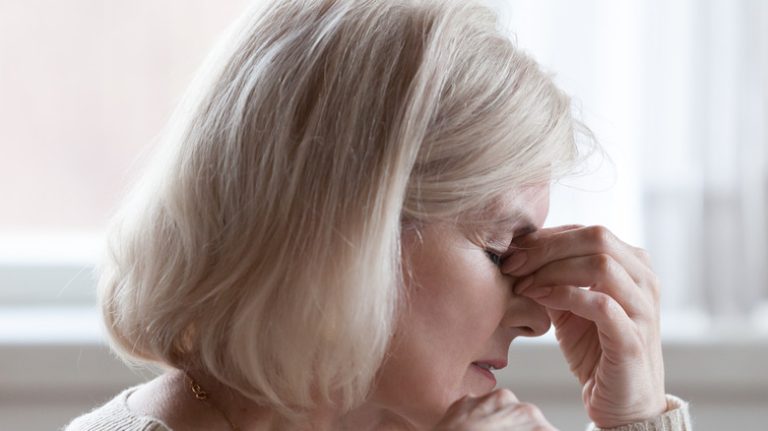This article contains discussion of disordered eating.
Fans of “The Real Housewives of New Jersey” will notice a slightly different cast when they tune in for Season 13. Besides two new Housewives, they’ll notice that a longtime cast member of the show — Jackie Goldschneider — is getting a little less screen time, coming back this time as a friend of the Housewives. This was Goldschneider’s choice, albeit a reluctant one: As loyal viewers of “RHNJ” know, besides living in the crossfire of all the show’s interpersonal drama, Goldschneider also spent much of the last season publicly battling a longtime eating disorder. While her recovery has gone well, she realized she needed more space and privacy to continue her recovery than a full-time commitment to the show allowed. “It was the best choice for me,” she told Health Digest.
But while Goldschneider is seeking a more private lifestyle in which to care for herself, she continues to be unapologetically open about her struggle and the hidden shame that many people with eating disorders experience. She chose to be open about her recovery on “RHNJ” to foster awareness of eating disorders and to encourage those experiencing them to seek help. To promote this goal, she also has an upcoming book about her struggle and recovery. In our exclusive interview, Goldschneider opened up about how she got trapped in disordered eating and what she’s doing now to stay well.
A stressful move in her teens led Goldschneider to overeating — then to near-starvation
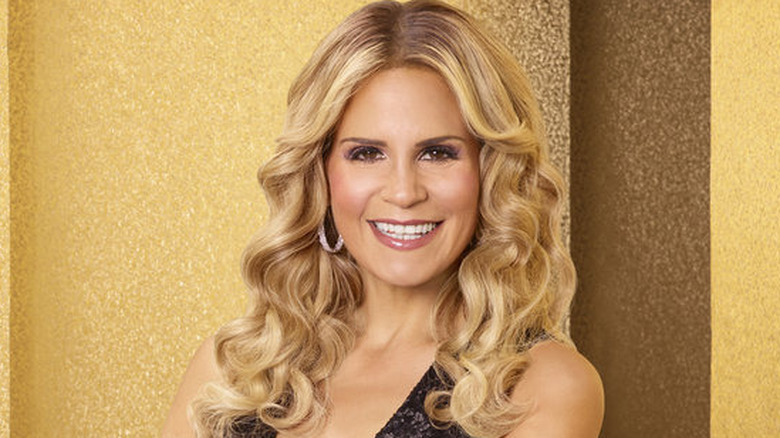
I understand that you’re quite willing to talk about your struggle with eating disorders, and we’d love to talk to you about that.
Yes, I’m open about it because I feel like one of the reasons I stayed sick for so long was because nobody talks about it. I had a lot of shame and a lot of secrets, and I wish people did talk about it, because then maybe I would’ve gotten some help sooner.
You’ve been very frank about your continuing recovery. Would you mind sharing when you first started experiencing disordered eating and what might have triggered it for you?
Disordered eating started in high school for me. I moved; I was really lonely. I had hardly any friends in a new town. I was in a new development, and there were no houses around me. I went from an area where I had tons of friends and a big social life to being alone all the time. I started overeating a lot, and I got really heavy, and I hated it. I had a doctor my senior year of high school who told me to go on Weight Watchers, and that started 30 years of disordered eating for me.
I wasn’t anorexic probably for another 15 years. I started disordered eating with Weight Watchers. I’m not saying Weight Watchers does that to people, but it did that to me. By the time I was 26, I started starving myself. I did that for 18 years — I starved myself for 18 years. It’s so hard to get out of it when you’re so far in it. If you don’t get out of it, you keep falling further in, and you don’t know what to do because you get so scared of going backward.
Goldschneider knew she had a problem but was scared to confront it

That’s a long time. When did you realize that it was a problem that you needed to address?
I realized it was a problem pretty early on, but it wasn’t something I was willing to address. It’s such a loaded question because I knew — I’m going to talk more about the anorexia, because that’s when the health issues started. When I was 26 years old, I became anorexic, and I knew when I had reached a certain weight that I was in a dark place.
When I was 30 years old — I talk about this in the book; I go into detail — I took a vacation where I was so scared to eat anything that I brought my own food with me and I wouldn’t eat in the restaurants. Instead, I’d put the food into my pocketbook, and I would go to the bathroom and eat in the bathroom out of my pocketbook and then go back to dinner. I remember crying in the bathroom and thinking, “I don’t know how long I can do this for.” Then I went and did it for another very long time, another 15 years.
I knew it was a problem at the start, but I was too scared to stop because I didn’t want to go back to being heavy, because being heavy was such a traumatic time in my life. The turning point for me to get help was when I was 45 years old. Sadly, it took that long — 44, actually. I didn’t stop until I was 44.
Regular therapy continues to be a key part of her recovery
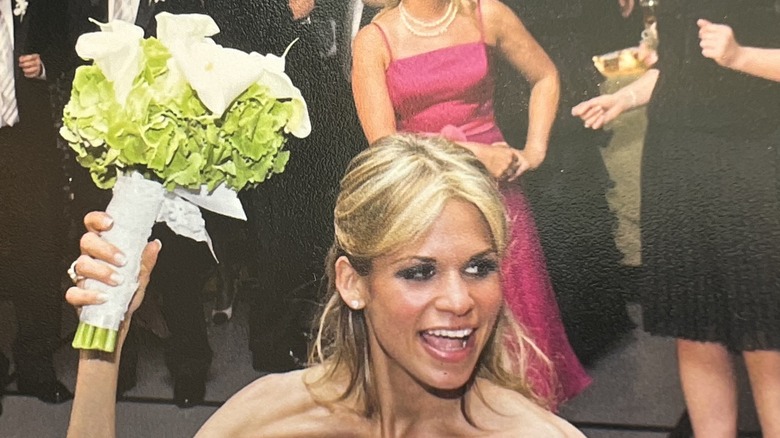
Jackie Goldschneider
Did you seek any professional support when you decided to make this change? What kind of help did you get?
Yes. I had decided along the way — maybe 20, 30 times — that I was going to stop, and I didn’t seek any help. When I did finally decide “This is it, and I actually have to do this,” I started with the only thing I knew: Renfrew. I had only known the name, which is an eating disorder center. They have outpatient centers in a lot of different areas. Then they have two inpatient centers. I knew there was a Renfrew in the Tri-State area. I didn’t realize quite how close it was, but it turned out to only be a half hour from my house.
I called Renfrew, and they set me up with an eating disorder psychotherapist, who then put me in touch with an eating disorder dietician. Then I got an eating disorder internist. I had a whole team that I was working with.
That’s great. What steps or practices have you been doing to aid your recovery in your daily life?
I was never [in] inpatient, so I started twice a week, which was with the psychotherapist and the nutritionist dietician, and now I’m still at once a week. [Keeping] up with that is very important, because a lot of people don’t know that eating disorders are a mental illness. A lot of people are even scared to say those words. But when you’re not eating because you’re scared of what it will do to your body, that’s not only a diet thing — that’s your way of thinking.
All of that has to change, so keeping up with your therapy is so important. I would not have been successful without a lot of therapy, because it’s a lot of your thought process that has to change and has to become okay with a body that’s different than the body you’re living in. That takes a lot of work.
[In] my daily life, I had to learn a lot of tools in therapy that I have to carry through. Even though I am in such a great place right now, I still sometimes have to talk myself through situations, and that’s okay. It’s only been a year and a half. I’m giving myself the time and the space, but I have not gone backward at all. Sometimes I stay still and I don’t move forward for a few weeks at a time, but I never go backward.
Stepping back from The Real Housewives of New Jersey was a tough decision, but she has no regrets
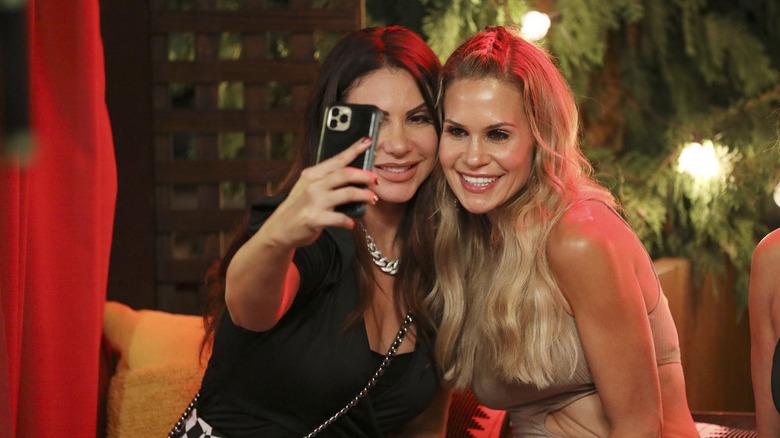
Danielle del Valle/Bravo
Another thing is that you’ve chosen to step back from your role in “Real Housewives” this year, going to friend status instead. How has that been helpful for you?
That was a tough decision, and it’s not one that I necessarily wanted, but it was the best decision for me. That gave me the space to recover privately. Even though I wanted to do it publicly, it was better for me to do it privately. It gave me also … I’d say until about five months ago, six months ago, [I] had a very bad habit of using food in ways that food is not supposed to be used. If I would get stressed out, it felt good to me to not eat. If I felt a little out of control, I would hyper-control my diet and I would restrict everything. It made me feel good. I know that seems very backward to some people, but that’s how I soothed myself.
Knowing that as a friend, I was not going to be the center of any massive drama on the show, took a real load off of my shoulders in terms of [wondering], “What am I going to do if I get stressed out? What am I going to do if things get out of control?” Because I didn’t have to worry about that. On the one hand, I had a real ego punch with my job, but on the other hand, I can’t imagine having to recover and having to go through something so stressful [while] being in a massive fight on television.
She seeks to end the stigma around discussing eating disorders
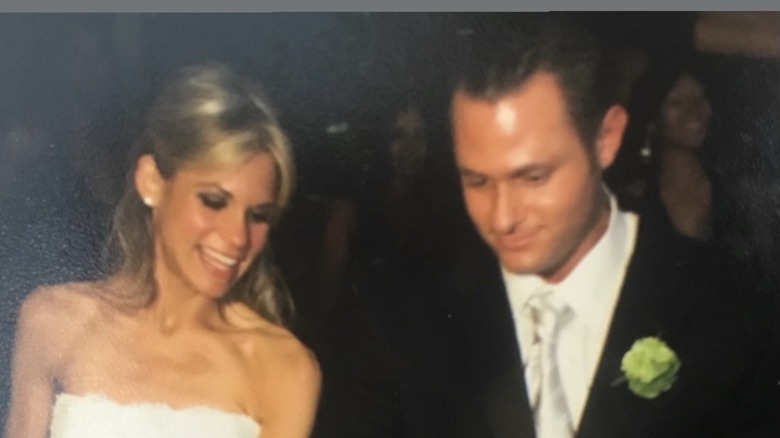
Jackie Goldschneider
You noted before that eating disorders are not an easy thing to talk about for a lot of people. What made you decide to be so open about your experience?
I realized that I couldn’t talk about my eating disorder for so long because I didn’t think anybody would understand. I didn’t think anybody else had it except for me, because no one talked about it. If I can let people know that you are not alone, that so many people have disordered eating and so many people have eating disorders, and if I can let people know that it’s okay to talk about this, then maybe we will get help sooner. People don’t realize that you can die from anorexia. Anorexia, I think, is the number one leading cause of death from mental illness.
It’s got the highest mortality rate of any eating disorder and of any mental illness, and it can destroy your body. The things it did to my heart and to my fertility and to my hormones and to my liver … It did horrible things, and it makes me so angry that I stayed like that for so long because I thought I was the only person. I thought, “If I talk about this, I’m going to sound crazy. If I tell anyone the way I starve myself, I’m going to sound crazy.”
If I can let people know that you are not crazy, you are not alone, you are not the only ones struggling with this, and get people talking about it and get people to seek help faster, then I will have done my job here on earth.
Here are some resources she recommends if you’re struggling with food
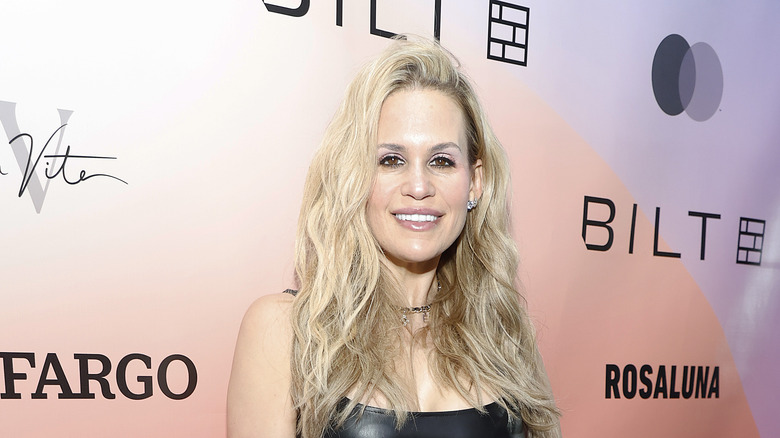
John Lamparski/Getty Images
You’ve mentioned your book — can you tell us a little more about that?
Yes — it’s called “The Weight of Beautiful.” It’s out September 26, 2024; it’s available for pre-order now. I’m really proud of it. I don’t think there’s been a public figure who wrote a book honestly about eating disorders probably since Portia de Rossi. It’s needed.
It’s my journey, but with a reality show twist and how being in the center of one of the most highly rated reality shows of all time and trying to hide this terrible world of secrets on a very public worldwide stage … [it’s] what that was like and how, ultimately, the show did end up saving my life by forcing me to come clean.
That sounds fascinating. What advice would you share with someone who’s struggling with an eating disorder or has friends or family who’ve got one?
First of all, there is so much help available. NationalEatingDisorders.org — NEDA, if you Google them, they have a helpline. They have a lot of resources on their page. I didn’t know any of this. There are tons of specialists, psychotherapists, [and] dieticians covered by insurance that you can reach out to for help. Talk about it. No one’s going to think there’s so many people struggling like you that you can find people to talk about it with.
But definitely Google the National Eating Disorders Association, and they have lots of resources to help you — and get started. If you have that moment where you’re like, “I should do something,” do it — strike! Because it’s easy to get sucked back into it, and it’s scary. Recovery is scary and recovery is hard, but life is so much better on the other side. It really is.
“The Real Housewives of New Jersey” airs Tuesdays at 9 p.m. ET/PT. Each week, the episode will stream the next day on Peacock. “The Weight of Beautiful” is available for pre-order now and will be out on September 26.
If you need help with an eating disorder, or know someone who does, help is available. Visit the National Eating Disorders Association website or contact NEDA’s Live Helpline at 1-800-931-2237. You can also receive 24/7 Crisis Support via text (send NEDA to 741-741).
This interview has been edited for clarity.

